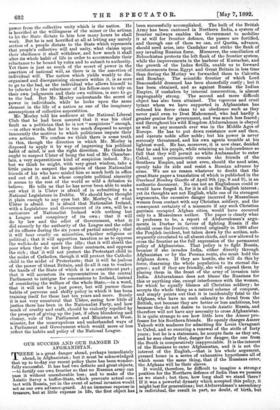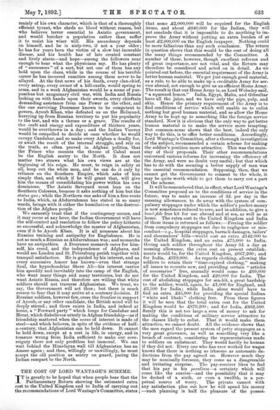OUR SUCCESS AND OUR DANGER IN AFGHANISTAN.
rp.HERE is a great danger ahead, perhaps immediately 1_ ahead, in Afghanistan ; but it must be acknowledged that up to to-day our recent policy there has been wonder- fully successful. It has had two definite and great objects, —to fortify our own frontier so that no Russian army can pass it without unendurable loss ; and to make of the Asiatic Savoy a buffer-State, which prevents actual con- tact with Russia, yet in the event of actual invasion would net as our own advance-guard. At an immense expense in treasure, but at little expense in life, the first object has been successfully accomplished. The bulk of the British Army has been cantoned in Northern India, a system of frontier railways enables the Government to mobilise it at will for frontier defence, the passes are fortified, and through one of them we can, vid Quetta, advance, should need arise, into Candahar and strike the flank of any invading Russian force. Moreover, the conciliation of Beloochistan protects the left flank of the frontier system, while the improvements in the harbour of Kurrachee, and the growth of the Indus flotilla, enable us to forward reinforcements from Egypt and Great Britain in leas time than during the Mutiny we forwarded them to Calcutta and Bombay. The scientific frontier of which Lord Beaconsfield dreamed has been shamefully costly ; but it has been obtained, and as against Russia the Indian Empire, if unshaken by internal insurrection, is almost impregnably strong. The second and more difficult object has also been attained. The vigorous and cruel tyrant whom we have supported in Afghanistan has reduced his fierce clans to an obedience such as they never paid even to Dost Mahommed, who had hardly a greater genius for government, and was much less feared ; and throughout his wild Kingdom Abdurrahman is obeyed as well as any monarch ever was in the Middle Ages of Europe. He has to put down resistance now and then, and execute noble after noble; but his power is never seriously threatened, and his own agents tremble at his lightest word. He has, moreover, it is now clear, decided that he and his people, while retaining an independence so full that they will permit no white Ambassador to enter Cabul, must permanently remain the friends of the Southern Empire, and must even, should the need arise, openly take its side and resist a Russian advance by arms. We see no reason whatever to doubt that the great State paper a translation of which is published in the Overland Bombay Gazette of April 9th (pp. 8 and 9), is an authentic document. No one not an Englishman could or would have forged it, for it is all in the English interest ; yet its thoughts are not English, while one of its strongest arguments, the excessive danger incurred by Mussulman women from contact with any Christian soldiery, and the consequent certainty of a massacre if any such Christian garrison occupied Afghan cities, would have occurred only to a Mussulman author. The paper is clearly what it professes to be, a report of Abdurrahman's argu- ments in Durbar in favour of fighting Russia if she should cross the frontier, uttered originally in 1886 after the Penjdeh incident, but taken down by the scribes, sub- sequently circulated to all absent chiefs, and now allowed to cross the frontier as the full expression of the permanent policy of Afghanistan. That policy is to fight Russia, because if she invades India, either directly through Afghanistan or by the Persian route, she must hold the Afghans down. If they are hostile, she will do this by force, disarming the whole population to its eternal dis- grace; and if they are friendly, she will expend them by placing them in the front of the army of invasion into India. Abdurrahman does not blame the Russians for this or anything else, except interference with the women, for which he equally blames all Christian soldiery; he accepts the whole thing as a natural scheme of conquest, and simply points out that it is incidentally fatal to the Afghans, who have no such calamity to dread from the British, not because they are better or less ambitious, but because they do not desire to invade Asiatic Russia, and therefore will not have any necessity to cross Afghanistan. It is quite strange to see how little love the Ameer pro- fesses for his Southern friends. He openly charges Ameer Yakoob with madness for admitting Sir Louis Cavagnari to Cabul, and so ensuring a renewal of the strife of forty years ; but he is a statesman, he accepts facts as they are, and he sees clearly that, danger for danger, the one from the South is comparatively inappreciable. It is the interest of the Russians to enter Afghanistan, and it is not the interest of the English,—that is his whole argument, pressed home in a series of exhaustive hypotheses all of which mean the same thing, that if the Russians enter, the Afghans will be their slaves.
It would, therefore, be difficult to imagine a stronger position for the Northern defence of India than we possess as we stand ; but then, how long shall we stand there ? If it was a powerful dynasty which accepted this policy, it might last for generations; but Abdurrahman's ascendency is individual, the result in part, no doubt, of birth, but mainly of his own character, which is that of a thoroughly efficient tyrant, who sheds no blood without reason, but who believes terror essential to Asiatic government, and would butcher a population rather than suffer it to resist his wiser will. His ascendency depends on himself, and he is sixty-two, if not a year older ; he has for years been the victim of a slow but incurable disease, and his health has of late created constant and lively alarm—and hope—among the followers near enough to hear what the physicians say. He has plenty of " successors " of a sort, but not one of them has any hold upon the clans, while in the course of his terrible career he has incurred enmities among them never to be allayed. At the first news of his death, every clan-chief, every satrap, every owner of a hill-castle, would spring to arms, and in a week Afghanistan would be a scene of pur- poseless but sanguinary civil war, with India and Russia looking on with hands upon their swords, every chieftain demanding assistance from one Power or the other, and the one surviving Douranee known to be competent to govern, Ayoub Khan, who defeated us on the Helmund, hurrying up from Russian territory to put his popularity to the test, and win a throne or a grave. The results of the craft and energy and expenditure of thirteen years, would be overthrown in a day ; and the Indian Viceroy would be compelled to decide at once whether he would occupy Candahar, and so make every Afghan a deadly foe, or await the result of the internal struggle, and rely on the truth, so often proved in Afghan politics, that the Prince who mounts the throne of Cabul must be the English sentry to the North. It does not matter two straws what his own views are at the beginning of his reign. He must, to reign in safety at all, keep out the white men, and he can do it only by reliance on the Southern Empire, which asks of him simply that, and which if he will grant that, will give him the means of consolidating his power within his own dominions. The Asiatic Savoyard must lean on the Southern Colossus, because it asks nothing of him but the statue quo; while the Northern one asks of him a free route to India, which, as .A.bdurrahman has stated in so many words, brings with it either the humiliation or the destruc- tion of the Afghan people.
We earnestly trust that if the contingency occurs, and it may occur at any hour, the Indian Government will have the self-control and resolution to follow the policy hitherto so successful, and acknowledge the master of Afghanistan, even if it be Ayoub Khan. It is all nonsense about his Russian training and antipathy for Englishmen. He is not so much a Russian as Abdurrahman was ; and monarchs have no antipathies. A Doura,nee monarch cares for him- self, his creed, and the independence of Afghans, and would see London and St. Petersburg perish together with tranquil satisfaction. He is guided by his interest, and as every successive Ameer has known—even that strange Saul, the hypochondriac Shere Ali—his interest carries him speedily and inevitably into the camp of the English, who want many things and many territories, but do not want Asiatic Russia, and therefore are willing that white soldiers should not traverse Afghanistan. We trust, we say, the Government will act thus ; but there is much reason to fear that it may arrive at a contrary decision. If Russian- soldiers, however few, cross the frontier in support of Ayoub, or any other candidate, the British mind will be deeply stirred ; and there exists in India, and indeed at home, a "Forward party" which longs for Candahar and Herat, which disbelieves utterly in Afghan friendship—as if friendship mattered when the nexus of interest is made of steel—and which believes, in spite of the evidence of half- a-century, that Afghanistan can be held down. It cannot be held down, except at a cost in life, in energy, and in treasure wrung from India sufficient to make our sove- reignty there not only profitless but immoral. We can wait behind the Himalayan wall till Afghanistan has an Ameer again ; and then, willingly or unwillingly, he must accept the old position as sentry on guard, pacing the Indian rampart to the North.







































 Previous page
Previous page